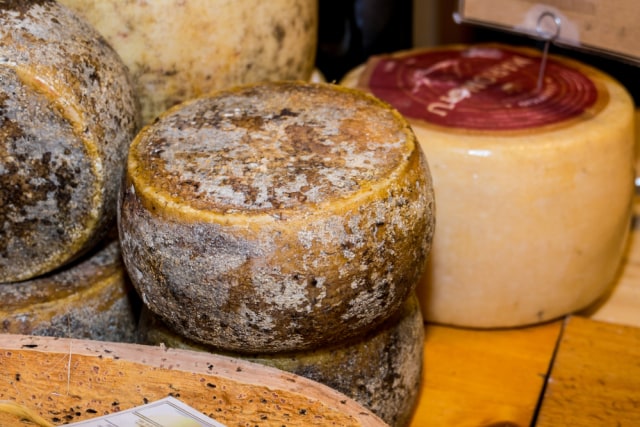Casu Marzu, a traditional delicacy from the island of Sardinia, Italy, is a unique and controversial cheese that has sparked fascination and debate among food enthusiasts and health authorities worldwide. This essay explores the production process of Casu Marzu, its cultural significance in Sardinian traditions, and the controversies and health concerns surrounding its consumption.

The production process of Casu Marzu is a meticulous and intricate affair that sets it apart from conventional cheeses. It begins with the fermentation of Pecorino cheese, a sheep’s milk cheese, under controlled conditions to create a soft and creamy base. What sets Casu Marzu apart is the introduction of cheese flies, specifically Piophila casei, to the cheese, which promotes decomposition. As the larvae hatch and feed on the cheese, they create a unique texture and flavor profile characterized by a pungent aroma and a slight tanginess. This process of enzymatic breakdown by the larvae results in a cheese unlike any other, with a taste that is both intense and complex.
Casu Marzu holds significant cultural importance in Sardinia, where it is more than just a cheese – it is a symbol of culinary heritage and identity. This traditional delicacy is deeply rooted in local customs and is often considered a rite of passage for Sardinians. Casu Marzu is not merely a food item but a centerpiece of social gatherings and celebrations, where its presence signifies abundance and hospitality. The act of sharing Casu Marzu with guests is a gesture of warmth and community, reinforcing bonds and traditions that have been passed down through generations in Sardinian culture.
Despite its cultural significance, Casu Marzu has faced controversies and health concerns that have led to legal restrictions on its sale and consumption in various countries. The presence of live insect larvae in the cheese poses potential health risks, including allergic reactions and gastrointestinal issues. This has sparked a debate between cultural preservation and public health safety, with some arguing for the continuation of this culinary tradition in the face of regulatory scrutiny. The clash between tradition and modern food safety standards highlights the complex relationship between food, culture, and health in the context of Casu Marzu.
In conclusion, Casu Marzu stands as a testament to the rich tapestry of Sardinian culinary traditions, blending unique production methods with cultural significance. While controversies and health concerns have cast a shadow over its consumption, the cultural importance of Casu Marzu cannot be understated. As debates continue to swirl around this divisive cheese, one thing remains certain – Casu Marzu is a symbol of Sardinian identity that continues to fascinate and challenge perceptions of food and tradition.